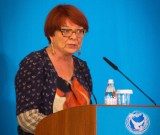'The nuclear weapon states (NWS) manage the current nuclear order', says Tarja Cronberg in an article The Challenges to the Ban Treaty published this week by the European Leadership Network (ELN).
Ms Cronberg chairs the Middle Powers Initiative, a joint program of the Basel Peace Office and Global Security Institute, and is also Member of the ELN Executive Board.
'Any effort to ban nuclear weapons, in order to be effective, has to have the support of the NWS' says Ms Cronberg. As such 'the consequences of the October 2016 vote (on a ban treaty) are uncertain. Negotiations on the treaty will take place in March and June/July 2017, most likely without the participation of the P5. The UN has no power to sanction and enforce their participation.'
'The five nuclear powers: China, France, Russia, the UK and the US, are the permanent members of the Security Council (P5) with veto power over any decision on threats to world peace. Furthermore, the P5 have absolute power over the Nuclear Non-Proliferation Treaty (the NPT).'
On the other hand, 'the UN resolution has already achieved some change' says Ms Cronberg. 'The non-nuclear weapon states have finally found a voice and they are the drivers of the debate. At a recent conference of the EU Non-proliferation Consortium held in Brussels, the very first panel dealt with the possibility of a ban treaty. The representative of Chile challenged those of the US, Russia and France, who were left on the defensive. Although the power is still with the nuclear weapon states, the NNWS have gained in bargaining power and are setting the agenda. Article VI of the NPT provides them with the legal backing.'
The most important thing for civil society and governments to do, argues Ms Cronberg, is to look beyond the ban treaty to 'a verifiable convention on nuclear weapons', i.e. one which includes the nuclear-armed States. Such a convention would set ‘clear timelines for nuclear disarmament. This would operationalize the disarmament article VI of the NPT, and would, no doubt, strengthen the treaty rather than undermine it.’
Click here to read the full article.
